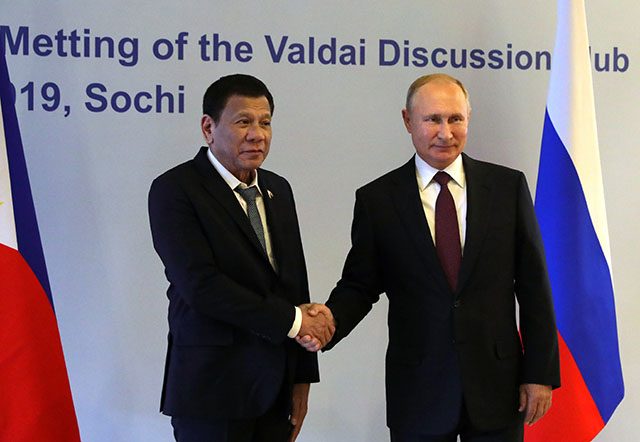
Allies of President Rodrigo Duterte played down concern about his health on Monday after the firebrand leader announced he is suffering from a chronic neuromuscular disorder.
Duterte, who has quipped that he might not live out a six-year term that ends in 2022, told members of the Filipino community in Russia at the weekend that he has a rare autoimmune neuromuscular disease that is causing one of his eyelids to droop.
News of the 74-year-old leader’s latest condition comes on top of back problems, migraines, a throat illness and another disease that affects the circulation.
“He has localized ocular myasthenia. He had been worked up on this and it has not progressed, it remained localized,” said a close Duterte aide, Senator Christopher “Bong” Go.
The president has had the condition for a long time, Go told Reuters, although Duterte’s spokesman, Salvador Panelo, told a news conference he only became aware of Duterte’s disorder after he mentioned it on Saturday.
“Nothing serious,” Go said, adding the president was “conscious of his health”.
Duterte’s ailments were to be expected because of his age, but they have not stopped his work and would not be a political issue, said Earl Parreno of the Institute of Political and Electoral Reforms.
Since his 2016 election, Duterte’s popularity remains at a level that other politicians would “die for”, Parreno said.
With an approval rating of about 80% and a super-majority in Congress, there is little prospect of an opposition challenge to his authority on health or any other grounds.
Opposition politicians contacted by Reuters declined or did not respond to request for comment on the health issue.
Punishing schedule
Known for a busy schedule and long speeches – often up to three a day – several disappearances from public view have fuelled rumours about Duterte’s declining health, but the government has repeatedly dismissed any suggestion of a problem.
Panelo said he did not think that the president’s latest illness was serious, adding it didn’t get in the way of his “punishing schedule” in Russia.
“I’m even amazed how he was able to survive this Russian trip,” Panelo said in an interview with ANC news channel.
There is no cure for myasthenia gravis, which causes muscle weakness, but treatment can help relieve symptoms.
Dr Jose Paciano Reyes, a fellow at the Philippine Neurological Association, said if a person had ocular myasthenia for more than two years, the chances were that weakness and fatigue would not spread to other muscle groups.
Duterte was the oldest person to be elected president in the Philippines since World War Two.
Late last year he said he had tested negative for cancer, and he blamed his long exposure to the sun when the public took notice of discoloration in his face.
The Constitution provides for the public to be told of the state of health of a president, if serious.
If a sitting president dies, is permanently disabled or removed through impeachment, the vice-president serves the remainder of a six-year, single term.
Vice-President Leni Robredo, a leader of the opposition, was elected separately in 2016.
Duterte’s known ailments include back issues, migraines due to nerve damage after a motorcycle accident and Barrett’s oesophagus, which affects his throat. He also suffers from Buerger’s disease, caused by heavy smoking in his younger days.
Duterte is known for an unorthodox work schedule that typically starts in the mid-afternoon and can go on well beyond midnight.—Reporting by Karen Lema; Editing by Matthew Tostevin and Jan Harvey



